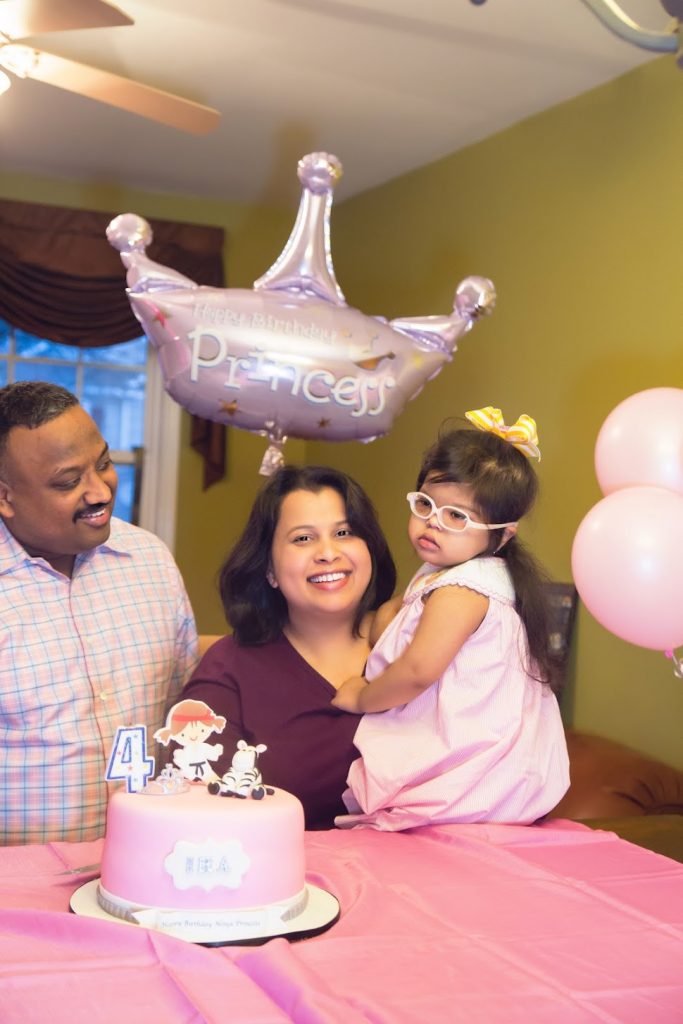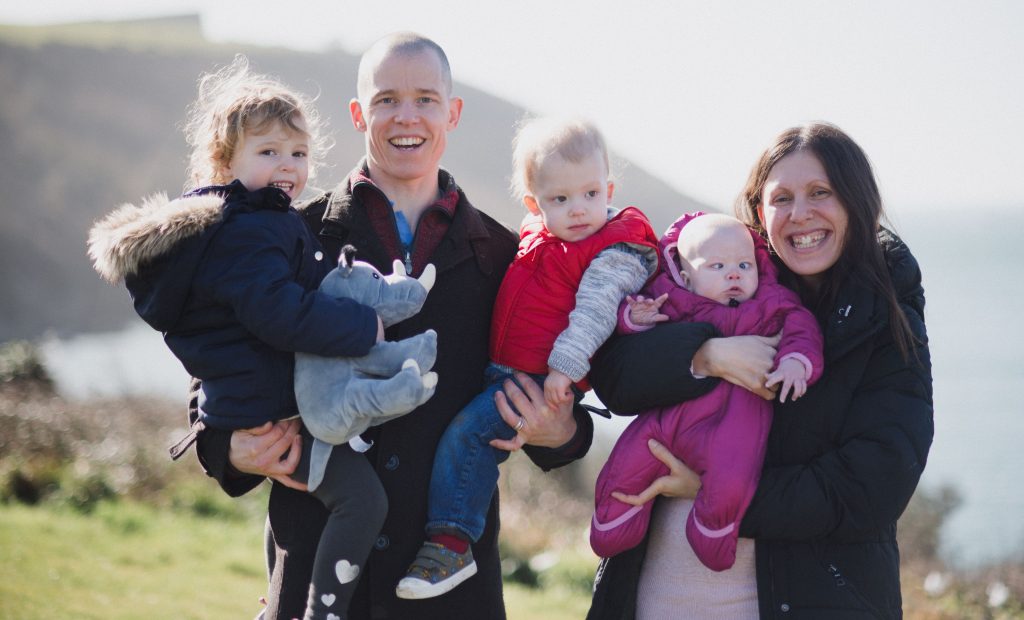Theme: Making Memories
Six years ago, my daughter Sasha aged out of the public school system. I was forewarned by our area agency, her medical team and school staff that this transition would not be easy. Yet as much as they prepared me for the challenges that lay ahead, I was still taken aback by the freefall that occurred immediately after “age-out” day.
On Sasha’s last day of school, her therapists, aides, classmates and classroom staff hosted a big party. We laughed as we sat with paper plates on our laps, reminiscing about so many incredible elementary, middle and high school years. After an hour or so, Sasha’s physical therapist asked if they could walk the halls together one last time. I held back tears as we loaded our van with Sasha’s favorite school supplies – a dinosaur stenciled pillowcase, a plush musical octopus, special blankets and chewies, clothing and hair supplies.
In preparation for the coming years and after careful consideration, we decided on the Parent Directed Management System (PDMS) for Sasha’s day program. Unlike the Traditional Day Program where an area agency provides staff and locations, the PDMS model would give us the autonomy to utilize Sasha’s annual Medicaid and State budget in varying ways. We would be responsible for hiring and overseeing our own staff and building goals around a program we created. This model would have its benefits and challenges, but our desire for a customized day program that emulated what Sasha loved most about school drove the decision.
In the early months, we struggled to find staff in our rural community, a challenge we anticipated. Then, a pandemic hit. Life halted for most, and the medical vulnerabilities within the special needs community temporarily froze all programs. Next came a surprise pregnancy. I was 45 years old, making me now at increased risk for COVID too, in addition to an unborn child. All systems were necessarily on hold.
Somehow, six years passed. Six years of Sasha remaining at home. Little structure was present in her days other than meal and medication schedules and instilling purpose and meaning was like watching a balloon float just out of reach. And so, It was with disbelief during Sasha’s 2024 annual physical that the topic of summer camp arose. Her PCP, the Medical Director at a camp serving individuals with special needs in southern New Hampshire, broached the topic, “With Sasha doing so well,” she began “do you think she’d be interested in attending camp next summer?” Doing so well? I recall thinking. Attend camp? “With you living a good distance away” she continued, “overnight would make the most sense of course. We offer 5, 7 or 10-day sessions”. Overnight would make the most sense? I thought. I sat there…stunned. But I knew this was a must-do for Sasha. She had barely left my side for six whole years. She was 26 years old.
When registration opened, despite the commute, I changed my application status from overnight to day camp. I wasn’t sure If I was ready to displace Sasha, however temporary. I envisioned her looking up at the ceiling of a camp cabin, wondering if she would ever return home. I didn’t think either of us were ready for something so big. Soon thereafter, we attended the open house, touring the facilities and grounds. We met camp counselors from all over the world and got a wonderful feel for the activities and programs provided each day. On the car ride home Sasha’s sister Nika, age 4, asked why she couldn’t attend too.
The excitement in our home was palpable as the first day of camp approached. Checklists and shopping trips, preparations and medical clearances were all complete. The night before camp started, we retired a bit early and told Sasha what lay ahead. Tomorrow, she had a place to be.
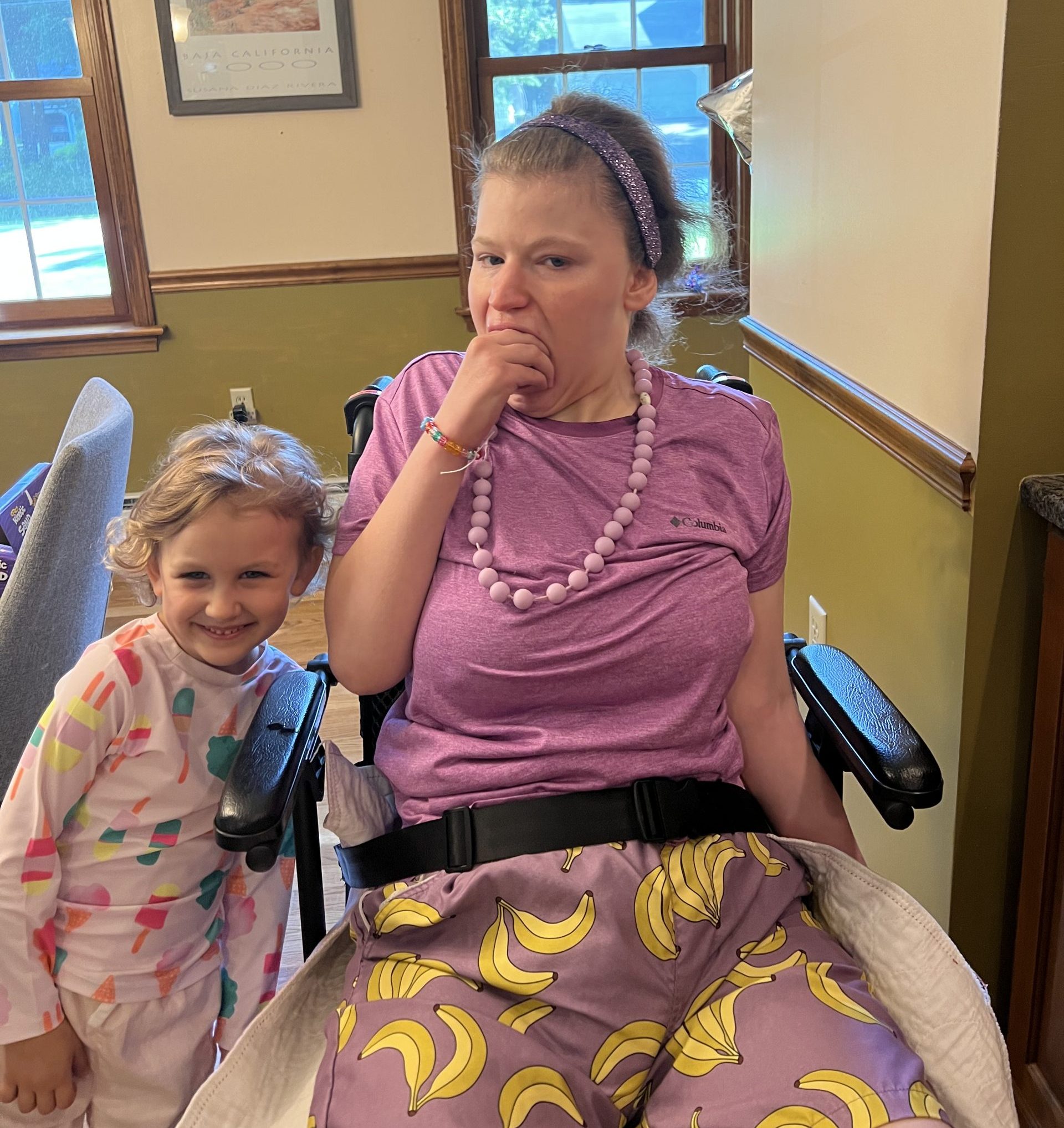 That first morning was surreal, reminiscent of routines from years ago when Sasha attended school. I felt a familiar pang as I prepared myself to allow someone else to care for Sasha. Her sister was stoic, asking if she could make Sasha’s lunch and silently loaded her bag. I tried not to let my mind wander. A haunting notion that a much deeper loss awaited us all one day kept rising. One day we will be packing hospital bags instead of lunches. One day Sasha will leave the house and not return home. But there was no time to dwell. Drop off time was near.
That first morning was surreal, reminiscent of routines from years ago when Sasha attended school. I felt a familiar pang as I prepared myself to allow someone else to care for Sasha. Her sister was stoic, asking if she could make Sasha’s lunch and silently loaded her bag. I tried not to let my mind wander. A haunting notion that a much deeper loss awaited us all one day kept rising. One day we will be packing hospital bags instead of lunches. One day Sasha will leave the house and not return home. But there was no time to dwell. Drop off time was near.
As we got out of the car there was one counselor left on the gravel road, waiting for their camper. I am self-aware enough to know that I spoke forever while introducing us all to Joyce. I shared Sasha’s likes and dislikes, which noises indicate discomfort and which noises express joy. I conveyed the importance of hydration and discussed her g-tube along with how to best feed her purees. Nika listened attentively but spoke little. As we drove down the dirt road leaving Sasha behind Nika cried out “I miss her already!” I understood. I did too.
For the next five days we learned and grew as we honed our routines. Nika would excitedly march ahead of me into Sasha’s room each morning, flip on the light and call out “Sashaaaaa…. it’s camp tiiiiime!”. Then she would meticulously discuss outfit options, all the way up to the headband. Lunch would get packed as I fed Sasha her breakfast and then Nika would hold the front screen door for me to help the wheelchair fit through the threshold. She was so proud that her sister had somewhere to be.
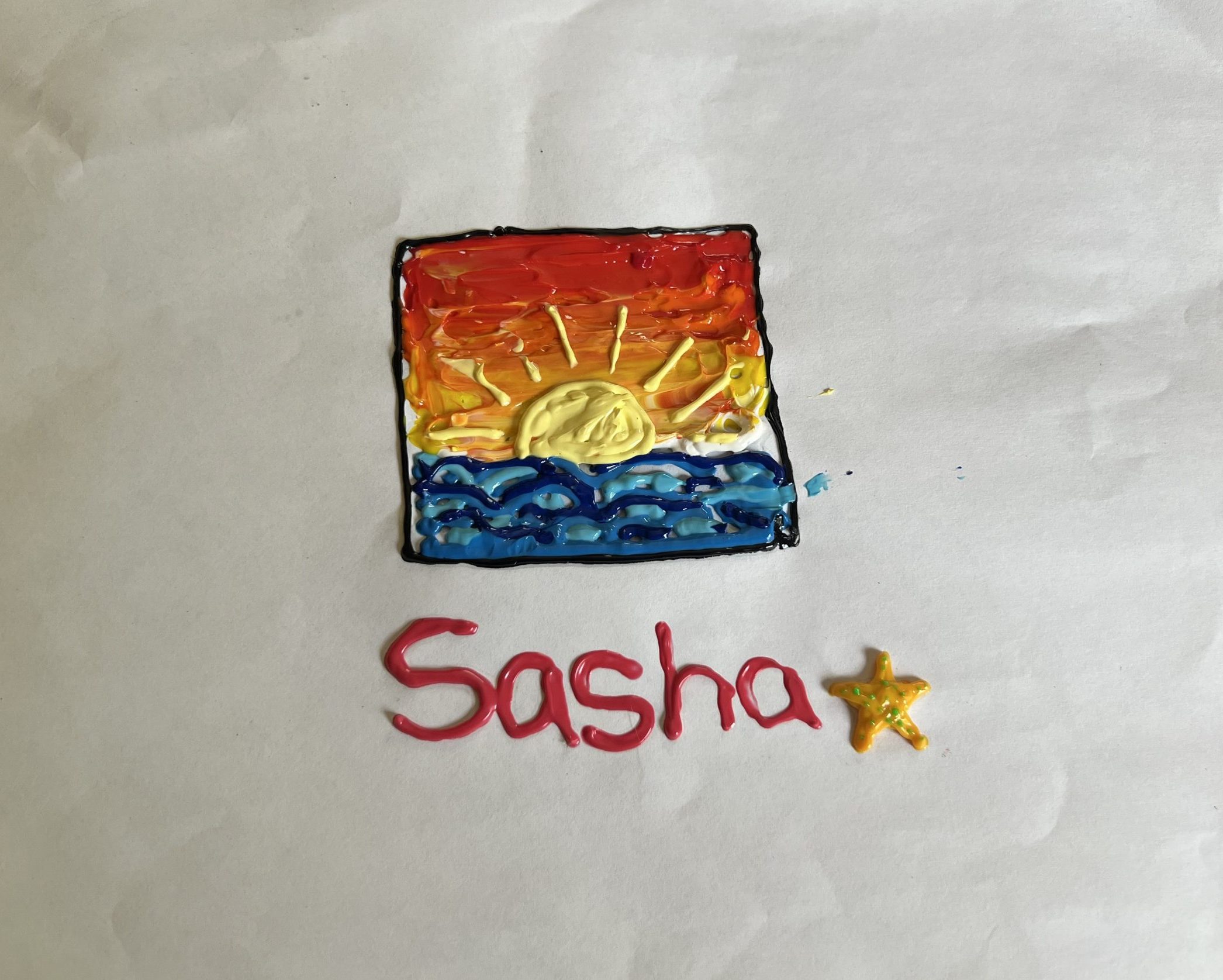 During daily pick-up we’d marvel at the joy Sasha’s arts and crafts brought us. Painted rocks for Mom and Dad, sunrise paintings for Sasha’s room, namesake beaded jewelry for her sister. But more than all those things, camp gave us a must-do schedule with Sasha as opposed to an optional one. Sasha was given structure, autonomy, identity and purpose. It also gave us one more thing, equity.
During daily pick-up we’d marvel at the joy Sasha’s arts and crafts brought us. Painted rocks for Mom and Dad, sunrise paintings for Sasha’s room, namesake beaded jewelry for her sister. But more than all those things, camp gave us a must-do schedule with Sasha as opposed to an optional one. Sasha was given structure, autonomy, identity and purpose. It also gave us one more thing, equity.
That word kept ringing in my ears as the end of camp neared. While reflecting on the people, the tone, the joy and the humanity that surrounded Sasha during her time at camp, movie reels of life throughout the years played in my mind. The reels mostly included Mike, Nika and I running to and fro while Sasha often stayed behind. We went out in the world to socialize or get things done and then report back. Meanwhile, Sasha’s day was unchanged.
During camp week, however, things felt…. equitable. Fair and impartial. Sasha would go out in the world for a day of socializing and productivity while we did the same. Both parties would report back with experiences to tell one another. What a gift camp gave us all.
________________________________________________________________________________________________________________
Joanne Huff comes to Courageous Parents Network as a long time follower and parent enthusiast of the organization. As the Mother of two girls, the oldest of whom has the rare disease MPS IIIA/Sanfilippo Syndrome, Joanne has benefited tremendously from the intimate parent interviews and candid, vulnerable story sharing throughout numerous thought provoking blog posts. As her daughter’s activities and lifestyle started to slow down with disease progression, CPN became a larger anchor in times of uncertainty and unrest. It is through this lens that Joanne hopes to share experiences and insights via the CPN blog.
Joanne completed nursing school after her daughter’s diagnosis, receiving her Bachelors of Science in Nursing from Plymouth State University, Plymouth NH. She enjoyed community liaison work with home care providers of adults with special needs up until her own daughter’s care became increasingly more involved. In addition to serving on the Boards of New England Regional Genetics Group (NERGG) and Adaptive Sports Partners through 2024, she has found great purpose in volunteer work advocating for policy improvements and change in Washington DC with the National MPS Society. In her free time, Joanne seeks balance and refuge with yoga, hiking and performing as an ensemble Soprano vocalist with the Pemigewasset Choral Society. When not blogging for CPN, Joanne enjoys sharing offerings on her personal Blog Folding Origami for God. She resides in Bow New Hampshire with her two daughters, Sasha and Nika, her husband Mike and her yellow lab Suki.
Theme: Making Memories
My daughter Bella was born 4 years ago with a very rare genetic disorder called Pontocerebellar Hypoplasia type 6 (PCH6), a mitochondrial disorder that is degenerative. She was given an 18-month prognosis and doctors told us to take her home, love her, and make as many memories as possible.
And here we are, over 4 years later, making memories. We’ve shared wonderful, problem-free days, and also fought through a lot of very bad days. The word “good” is all relative when you have a child with a life-limiting condition. “Good” is quite fleeting and your understanding of the word changes— sometimes from day to day, week to week, year to year.
Bella sets the mood of the day at our house. When we first brought her home and were trying to find the right cocktail for her seizure medications, there were a lot of bad days. I would sit and just hold her and cry, not being able to do anything to help her poor little brain calm down. When we got the seizures under control, the days started to get better. As we progress through her condition, it means doing what we have to do to maintain “good.” Whether it is more medication, more oxygen, a feeding tube, or more suctioning throughout the day. And I suppose when you deal with it day to day, you don’t really see so much how the disease is progressing and how much more you are doing to hold that line until you look back to where you started. Slowly, you learn to create a new normal and to adapt to it, setting new expectations of what a good day looks like.
I sometimes forget how normal it is and how comfortable I’ve become in talking about Bella, her condition, and our reality. Not that it doesn’t pain me beyond belief to talk about her struggles, but it also is a way to express myself. I am a member of a PCH support group and of course I can say anything to those parents. They know exactly what I’m talking about. It’s their “normal” too. So, it’s not shocking for them to hear what I have to say and consider a day a “good” day. But if I talk openly to others who are not in a similar situation about Bella, our daily life and routine, they are shocked. They cannot imagine living under these restraints, requirements, stresses, exhaustion, and limitations and calling any day a good day.
So what makes a day “good?”
Perhaps it’s just knowing that you did all you could to make your child comfortable, despite how challenging or hard the day may have been.
Maybe it’s just that your child had a few less seizures than usual and you didn’t even need to give extra doses of medication.
Maybe it’s getting the chance to spend more time with your child to play or read a book or just cuddle.
Or giving your child every opportunity to reach their potential.
A good day might be when your child perseveres despite the challenges.
Maybe good is just realizing that you have this one more day to share with your child, and you made the best of it.
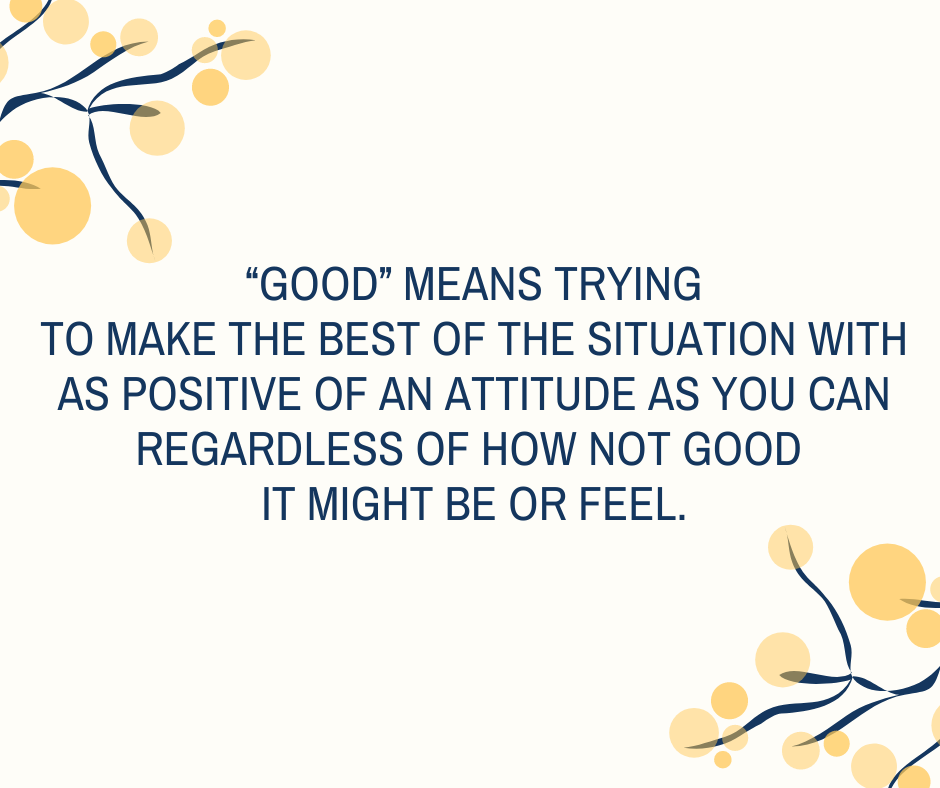 At the end of the day, I feel like I had a good day when I know that I did everything in my power to make Bella’s day a happy one, make her as comfortable as I could, and show her as much love as humanly possible. While sometimes I feel like we go through stages when there are many more bad days than good ones, Bella, so far, has fought through them and returned to her baseline. I know that someday that won’t happen, and she will be tired. But for now, I will fight for those good days with all my being, try to make even the hard days the best they can be, and give her everything she needs and deserves to live the best life of which she is capable. I know that my idea of a “good” day will change many more times during Bella’s time with us. The “normal” will change and I will grow to accept things that I never thought I would need or have to. But as long as she is comfortable, pain-free, and she continues to give me those tiny signals, that only I would understand, that she is happy and wants to keep fighting, I will fight for her, and beside her.
At the end of the day, I feel like I had a good day when I know that I did everything in my power to make Bella’s day a happy one, make her as comfortable as I could, and show her as much love as humanly possible. While sometimes I feel like we go through stages when there are many more bad days than good ones, Bella, so far, has fought through them and returned to her baseline. I know that someday that won’t happen, and she will be tired. But for now, I will fight for those good days with all my being, try to make even the hard days the best they can be, and give her everything she needs and deserves to live the best life of which she is capable. I know that my idea of a “good” day will change many more times during Bella’s time with us. The “normal” will change and I will grow to accept things that I never thought I would need or have to. But as long as she is comfortable, pain-free, and she continues to give me those tiny signals, that only I would understand, that she is happy and wants to keep fighting, I will fight for her, and beside her.
Walk Through a GOOD Day with Bella and Her Mom
I wake up at 6:00 AM feeling relatively rested because Bella slept through the night with no issues; the feeding pump didn’t go off in the wee hours of the morning, her oxygen stayed above 95, and she didn’t have any seizures during the night.
I enjoy a fresh cup of morning coffee and get started on my work. I feel lucky if I get most of it done before Bella’s routine starts and Bella’s two-year old sibling wakes up.
Bella wakes up with not too much gunk or reflux and we can complete her chest PT and morning routine with no issues. She gives me a few early morning smiles. I dress her while telling her how pretty she is. I put her trunk support and wrist braces on, and sit her up in her chair and she is calm. I am able to sit down for a few minutes and drink some of my second cup of coffee while it’s hot; before I have to reheat it three times.
She takes an early nap and wakes up again around noon in time for school (via distance learning). Bella has a fun day at school as we sing songs, work on an art project, and play with a sensory toy that allows her to experience a new smell, feel a new sensation, or hear a new sound. She sees other children, albeit through a screen.
Throughout the day she doesn’t have strong jerkies. She coughs on her own when she needs to, and doesn’t need deep suctioning more than two or three times. The feeding pump doesn’t get clogged or go off at random times.
When her feed ends, there’s not too much reflux and she is comfortable. We read a book (her favorite books are ones that are larger and have bright colors), or watch a show, play a game, or play with her sisters. She smiles as her little sister gives her a toy or a hug.
It’s wonderful if we can fit in a walk, since Bella loves to be out in the fresh air and feel the sunshine on her skin. After the walk, she comes downstairs with me to motivate me while I do a workout.
I remember to give all of her medications on time, and there aren’t any poopy blowouts. Evening comes and Bella accompanies me in the kitchen while I make dinner and her food. We listen to music together. She’s good company in the kitchen and I love to have her close so I can look over and see those rosy cheeks.
She doesn’t get any early evening jerkies or have reflux. I give her the evening chest PT treatment while talking to her about the day, and get all the gunk out so she can sleep peacefully. I lay her on the couch next to me to rest while we finally all come together as a family to relax for a bit before going to bed.
She is calm and cuddles in with her soft blankets and falls asleep on the couch. I put her in her crib and she falls asleep. All her stats are where they need to be, and she is peaceful and quiet. Her dad and I get a few minutes to talk, cuddle, or just sit together before one of us goes up to bed and another stays on the couch to sleep next to Bella that night. Bella gets her late medications and remains asleep. I get to bed before midnight.
And as I drift off, I remember that it is in fact Bella who gave me the best day of my life—the day she was born and she made me a mommy. Now it is my turn to make every one of her days the best day of her life.
Beth and her husband Bill live in Ashburn, VA with their three daughters, Kayla Joy, Isabella (Bella) Grace, Lilliana Faith and their dog Hunter. The family purchased an RV to travel with Bella who loves being out and about in nature with her family. Together they took a Make-a-Wish trip to Morgan’s Wonderland and Sea World. Currently, Beth is working on a quilt for Bella. Each piece represents a memorable experience with her daughter.
Theme: Making Memories
My son found a broken dinosaur mood ring in the bottom of a drawer as we were cleaning his room. We had purchased it for his brother Roman years earlier at a dino exhibit happening in our city. His brother was still alive at the time.
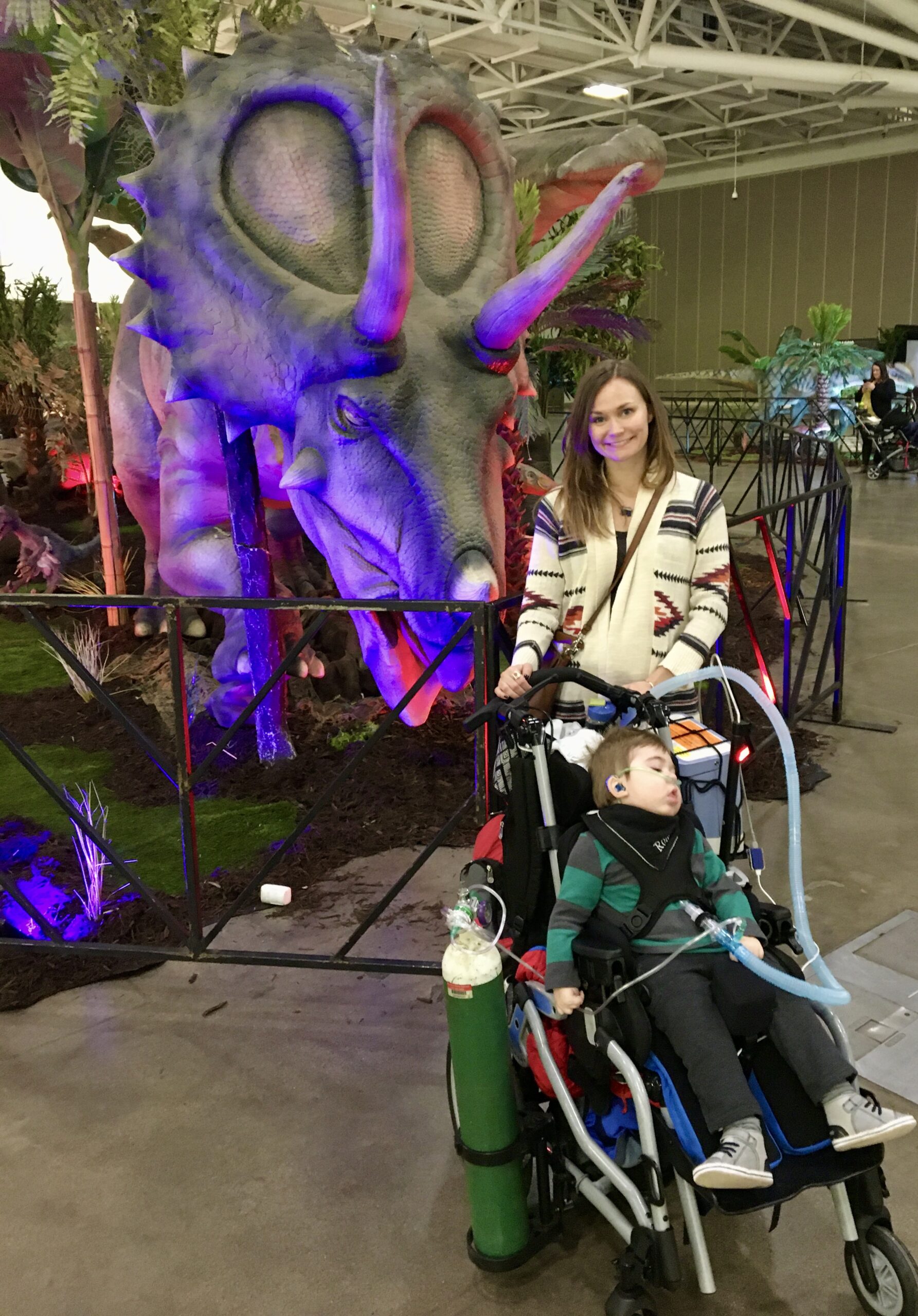 Roman traveled to the exhibit in his wheelchair with tanks mounted on the chair’s back that supplied his air with a hiss. Alongside the tanks was a beeping oximeter strapped on using the same bungee cord his dad used to secure his helmet onto his motorcycle. The chair bogged down by other medical equipment–suction machines, sterile water, a feeding pump and extra doses of medication for pain–created an island of “life accessories” surrounding a little boy with cherub cheeks and light blue eyes. Leaning forward, I pushed hard on the heavy chair as I turned the corners of the convention center’s dino exhibit. I navigated the terrain as nimbly as the strollers with uninhibited toddlers in them. My older son briskly ran ahead with his Nana in tow. Her wallet was ready to supply bills for souvenirs; the plastic junk that holds the memories of family outings.
Roman traveled to the exhibit in his wheelchair with tanks mounted on the chair’s back that supplied his air with a hiss. Alongside the tanks was a beeping oximeter strapped on using the same bungee cord his dad used to secure his helmet onto his motorcycle. The chair bogged down by other medical equipment–suction machines, sterile water, a feeding pump and extra doses of medication for pain–created an island of “life accessories” surrounding a little boy with cherub cheeks and light blue eyes. Leaning forward, I pushed hard on the heavy chair as I turned the corners of the convention center’s dino exhibit. I navigated the terrain as nimbly as the strollers with uninhibited toddlers in them. My older son briskly ran ahead with his Nana in tow. Her wallet was ready to supply bills for souvenirs; the plastic junk that holds the memories of family outings.
For every family, finding things to do together to make childhood memories can feel like an administrative job for parents at times. Search the events, buy the tickets, pack the diaper bag, and make sure the phone is charged for pictures to document it – photos that can be used for future graduation party collages, social media posts, and reminders that our children were once young and innocent. When your child has a shortened life expectancy, the photos serve a different purpose. They are proof that they were here and lived a life with you by their side. Each outing carries a different, greater weight. For my Roman, this meant the physical weight of his chair, the weight of worry that something may go wrong while out in public, as well as the pressure to make lasting memories.
Our outing checklists were long and included setting our phone alarms to remind us of medication times and making sure to remember the oxygen tank “key” that opens fresh tanks. Once forgotten, a “key” was now in every extra pocket imaginable. Forgetting a medical item with a medically unstable child isn’t like forgetting diapers and stopping at Target on the way to pick some up. It could mean an immediate exit and stressful ride home for relief or worse, a 911 call. The potential drama and weight of perfect planning made every family outing a carefully orchestrated event.
Having the bandwidth to execute a safe and worthwhile family outing also included a flurry of questions. Was this a winter event in the middle of cold and flu season? Had he just recovered from a respiratory virus? Was the risk of infection worth the memory making we would be doing? Worth the stress? Could we pay attention to big brother?
Even when I had meticulously planned an outing, packed, potentially scheduled a nurse or additional adult with medical skills to accompany us, weighed the pros and cons, there was a new kind of pressure. The pressure to not just GO but to make it SPECIAL. Knowing your child has little life to live, you have the added pressure of making every trip to the pumpkin patch magical. I accrued photo ops with determination as I bowled people over with a hefty wheelchair, a smile and sweet “excuse me.” When your child’s health is delicately balanced between fragile and “touch and go,” seizing stable days when the stars align with low virus levels, comfortable temperatures and a fun event feel urgently necessary.
Each memory captured in photos is two-dimensional proof that I did my best. If I could do it over again, I would do more. But that careful dance of risk and reward was never easy to navigate and so I give myself grace. My overprotective nature probably kept us from some events that would have been just fine, but it also may have kept him here longer and I would have walked on my hands to get a few more months. Sometimes it felt like I was in fact, inverted.
If I could go back in time, I would have told myself that I was adaptable and competent enough to leave the safety of home and make more memories. This might sound like silly advice especially to naturally easy-going individuals, but for those type-A parents out there feeling intimidated by the burden of living in constant fight or flight, waiting for the next medical emergency know that it’s ok to relax. You will be competent in a relaxed state.
We were lucky enough to receive palliative services early in his life. This meant I felt like the CEO of a multidisciplinary team that had been assembled to make my child’s life full of quality filled days even if it sacrificed quantity.
I remember calling the palliative nurse soon after first receiving services. The novelty of having an on-call number provided to us was still there. I felt guilty as I called the nurse’s cell to ask if we could go to the park or if she thought he was too unstable to make the trip. Thinking it was less important or that I was bothering her because it wasn’t about medication. “I would be disappointed if you didn’t take him to the park,” she said, “and don’t apologize for calling, that is what we are here for.” They gave us the tools to embark on our memory making adventures. It also allowed us to have support at home if he came home from an event in slightly rougher shape than when he left.
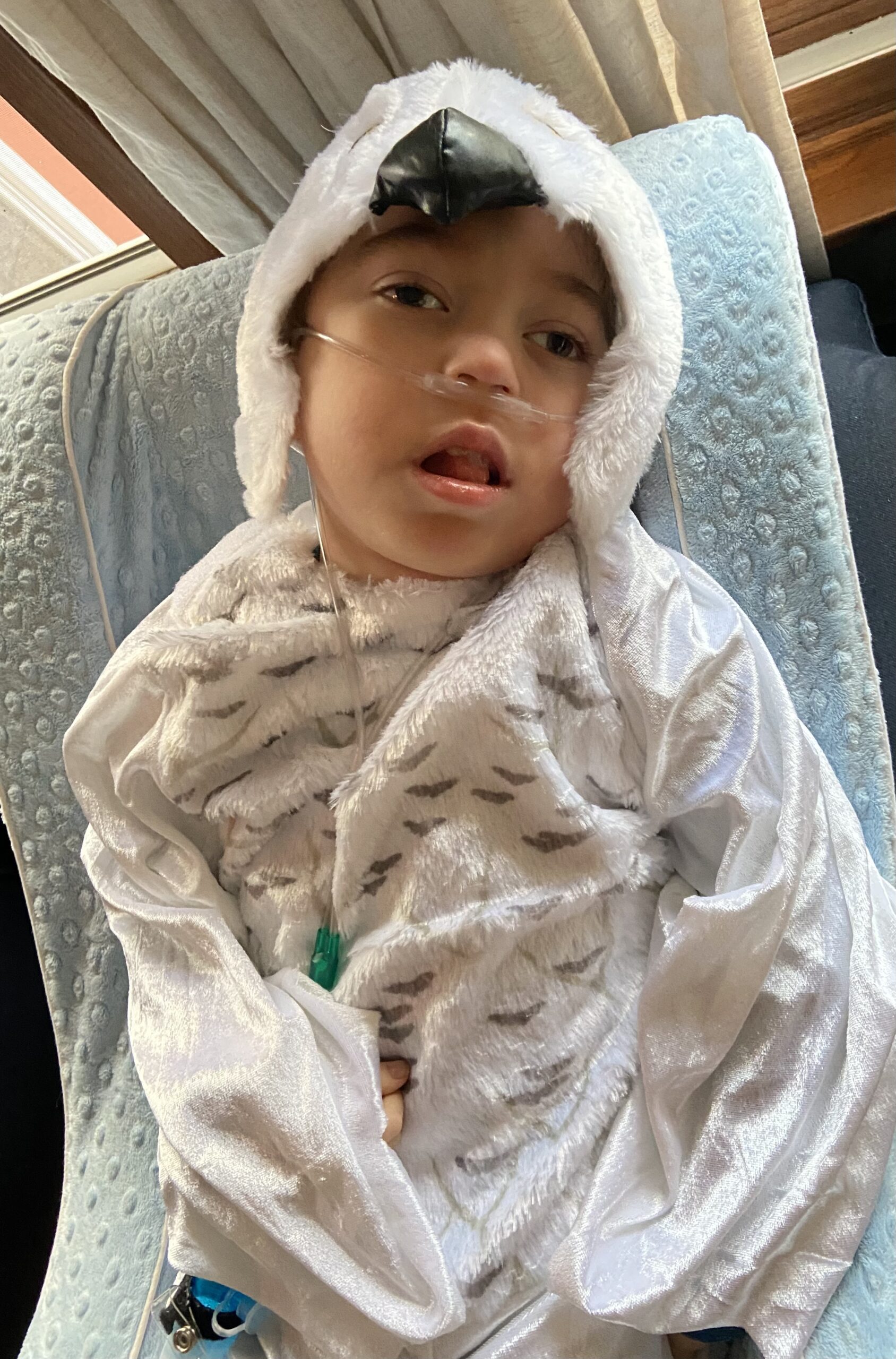 Kids seem to have a well of “oomph” to draw from to do the things they want to do. One Halloween, my son was having a hard time breathing and looked exhausted. His older brother, dressed in his Harry Potter outfit came into the room and asked if Roman would be able to join in trick-or-treating after dinner. I looked at his sweet face and at his brother and then back at him and shook my head no; disappointment clearly palpable between the two of us. But also noticeable was a look in Roman’s eyes. He perked up just the tiniest bit and for the next hour and a half his troubling symptoms ceased. I tentatively pulled on the fluffy owl costume over his clothes and tightened the cannula under his hat. His big blue eyes begging to go. I loaded him up and caught up with his brother and dad down the street running from house to house to get candy.
Kids seem to have a well of “oomph” to draw from to do the things they want to do. One Halloween, my son was having a hard time breathing and looked exhausted. His older brother, dressed in his Harry Potter outfit came into the room and asked if Roman would be able to join in trick-or-treating after dinner. I looked at his sweet face and at his brother and then back at him and shook my head no; disappointment clearly palpable between the two of us. But also noticeable was a look in Roman’s eyes. He perked up just the tiniest bit and for the next hour and a half his troubling symptoms ceased. I tentatively pulled on the fluffy owl costume over his clothes and tightened the cannula under his hat. His big blue eyes begging to go. I loaded him up and caught up with his brother and dad down the street running from house to house to get candy.
Know that if you can’t muster the energy to do something grand and carry the weight today because the pressure is too much, that’s ok. You don’t have to try too hard, memories of skipping the event and staying home will be just as precious.
But heck, now, when my son wears the mood ring from the dino exhibit it is so much more than a trinket bought by Nana. It is proof that we LIVED together. My son told me the tail of the brachiosaurus is broken, it stays black while the rest shifts, swirling with heat radiating blue, green, and purple. I replied with a little sadness in my voice knowing its importance. He said, “that’s ok. It’s right, I feel mostly happy but always with a little sadness because Roman isn’t here anymore.” An eight-year old’s wisdom, more concise and profound than mine. But he was here, and we pushed through the weight of it all to make some everlasting memories.
Kaitin Kelly Benedict is a former professional dancer who now only does pliés in her basement. She believes strongly in the health benefits of movement and creativity and has taught wellness classes for artists in the community, public schools, and at the university level. After the traumatic birth of her second son in 2017, her days were spent running an ICU out of her home and running to medical appointments. Since his death, she has redirected her focus toward embarking on a master’s in social work. Kaitin has always loved writing and particularly loves writing about her son Roman. She is also published in Months To Years literary journal.
Theme: Making Memories
Time together making memories as a family may feel especially precious when the child is living with a life-threatening medical condition. Making memories and sharing experiences that become part of the child’s legacy and the family’s treasure box can take many forms and can happen anytime: special occasions or a typical weekday.
There is meaning and legacy in experiences together; there is meaning and legacy in the concrete items that emerge from these experiences, such as photos, art, handprints, music.
This conversation is guided by researcher and Child-Life Specialist Dr. Jessika Boles, together with Soulumination’s McKenzie Johnson, who shares insights into creating meaningful memories and lasting legacies. Parents Kaitin Kelly Benedict and Angie Sutphen join the conversation, offering their personal perspectives.
Learning objectives:
- Describe the concept of legacy as it might intersect with the experiences of families of children with complex medical needs.
- Identify evidence-based applications of legacy research in support of children and families experiencing significant, extended, or life-threatening illness events.
- Explain barriers to and opportunities for enhancing legacy-oriented practices in healthcare environments to best meet the needs of patients and families.
Theme: Making Memories
With over 8.2 billion people across 195 countries, humanity is shaped by diverse societal norms, cultural differences, physical appearances, languages, religions, community structures, and traditions. However, two universal experiences connect us all: life and death.
The UN estimates that approximately 385,000 babies are born each day—around 140 million each year. The impending arrival of a child brings immense tradition, cultural norms, and hope. Celebrations, anticipation, and excitement surround each birth, whether it occurs in a hospital or a tribal community. New parents often receive books and advice on child-rearing, and a network of support from doulas, midwives, and medical professionals helps welcome each child into the world. Society generally expects us to watch our children grow into responsible adults who contribute to the greater good.
Birth has a clear timeline; a gestational period of 40 weeks is universally accepted as full term. In stark contrast, there is no roadmap for anticipating the imminent death of a child. If one is fortunate, they may be given time to make the most of their moments together. This time is often marked by a dichotomy of gratitude for each day of life, alongside fear and anxiety about what the next day may bring.
When we signed our last discharge forms for our daughter after deciding to pursue palliative care, I felt two powerful emotions: a sense of failure for not being able to do more and relief that she might finally be pain-free. Unlike the countdown to birth, we had no timeline for her remaining days. Our daughter had never celebrated a birthday at home; including the day she was born, she spent three of her birthdays in the hospital. As her mother, my only wish was for her to celebrate her fourth birthday at home, surrounded by love and joy, because she was our light. As a medical parent, I faced the harsh reality that the next birthday might not happen.
With two medically complex children receiving concurrent treatments for rare diseases, we had never spent time together simply enjoying our family of four. Thanks to a compassionate palliative care team and Make-A-Wish, we were able to take our daughter to the seaside cliffs and misty coastline of Big Sur. While the trip was filled with smiles and love, there were also moments of fear when her vitals approached a point that could lead to hospitalization in an unfamiliar place. Looking back, the overwhelming emotion we felt upon returning home was relief that our daughter did not pass away in a new hospital surrounded by strangers. I also felt a sense of guilt, knowing we were one of the lucky few families to experience such a trip.
Not long after, we celebrated our daughter’s birthday at home, inviting our closest friends, aware that we might need to cancel at any moment. As parents, we are seldom prepared for such unknowns. Today, we cherish those party pictures more than anything, as they remind us of something we never anticipated would happen.
Shortly after her birthday, I asked our palliative care team for a meeting, overwhelmed by a sense of panic. I expressed how unprepared I felt for the possibility of losing her. Fear of the unknown consumed me—where would it happen, how, and who would we call? We were unfamiliar with cultural practices surrounding death and did not know what to do afterward. At that time, our then 4-year-old daughter was surprisingly active, crawling and pulling up to stand, seemingly unconcerned by our discussions. The medical team was surprised by her progress, and we laughed about how I was overthinking everything as a typical medical mom. My husband and I had envisioned a plan for that day, involving our almost 10-year-old son as a vocal advocate and caring big brother.Our son had been an integral part of the medical care we had provided for our daughter and wanted to be involved in her end of life planning as well.
Then, the day we dreaded arrived, and everything unfolded differently than we had imagined. We experienced a pain unlike any we had known before. Our daughter brought us light, purpose, love, and joy. The one thing we could give her that day was the freedom to finally be pain-free and at peace. This realization helped us navigate that day and the days that followed, thanks to our palliative care team, who understood we were venturing into uncharted territory.
We expect our children to outlive us and care for us as we grow older. We envision our children living long, healthy lives, and the idea of a parent burying or cremating a child feels unfathomable. Society is not structured to support parents facing such loss, and when it occurs, the experience can be isolating and filled with sadness. While some child deaths can be sudden, others follow a long, painful journey where all options have been exhausted.
If our children cannot outlive us, we must create pathways to help families process this overwhelming life event differently—with knowledge and acceptance that this is part of the circle of life.
Parvathy was a member of our first class of Parent Champions. Learn more about her here.
Theme: Making Memories
There have been plenty of days where I don’t want to do this anymore. I don’t want to be a caregiver. I secretly crave a typical life. I want the “normal.”
 I’m tired of changing diapers. I’m tired of dealing with poop, mucus, and vomit. I’m tired of being held to a 3-4 hour schedule. I’m tired of doing this alone. I’m tired of being the one responsible for everything. I want the ability to run to a store solo or even with my child in tow, but without the confines of a wheelchair and all that it entails. I want to go away alone for a weekend, spontaneously. I want to visit friends and my son to be able to hangout with their kids instead of having to be next to me. I want to say yes when a friend calls last minute to invite me to a concert or for a massage. I want to hop in someone else’s car without hesitation. I want to get on a plane for a family vacation and easily rent a car. I want to send my kid to spend the summer with his grandparents. I want to hug my child with no barriers or concern for the wheelchair. I want to call the neighbor down the street and ask them to send my child home or ask if we can take turns watching the kids for parents night out. I want to dream about and plan to be an empty nester.
I’m tired of changing diapers. I’m tired of dealing with poop, mucus, and vomit. I’m tired of being held to a 3-4 hour schedule. I’m tired of doing this alone. I’m tired of being the one responsible for everything. I want the ability to run to a store solo or even with my child in tow, but without the confines of a wheelchair and all that it entails. I want to go away alone for a weekend, spontaneously. I want to visit friends and my son to be able to hangout with their kids instead of having to be next to me. I want to say yes when a friend calls last minute to invite me to a concert or for a massage. I want to hop in someone else’s car without hesitation. I want to get on a plane for a family vacation and easily rent a car. I want to send my kid to spend the summer with his grandparents. I want to hug my child with no barriers or concern for the wheelchair. I want to call the neighbor down the street and ask them to send my child home or ask if we can take turns watching the kids for parents night out. I want to dream about and plan to be an empty nester.
I want to plan and celebrate a college graduation, or watch my child fall in love, get married and begin his own parenting journey. I want to play with my grandchildren. But these are all dreams, desires, and wishes that will not come to fruition. I spent many days, nights, months and even years brooding over all of the losses carrying anger and bitterness for much longer than I should have. Refusing to let go, forgive, and live my best life now, I became physically sick and emotionally and mentally unwell. I didn’t and don’t want my child to get hurt or bear the brunt of my frustrations, especially over things that neither of us can control.
It is and has been an intentional decision to change how I view my situation, how I interact with and love my child, and how I create the best life for both of us. I’ve learned just how precious time is and to know our next breath isn’t guaranteed. Seeing tomorrow isn’t promised to us. I see and feel his health declining. In choosing to not resent my life I’ve had to find ways to make it meaningful, not just for him but for me as well. Knowing that our normal wasn’t typical, I’ve been determined to bring some typical things into our world of normal.
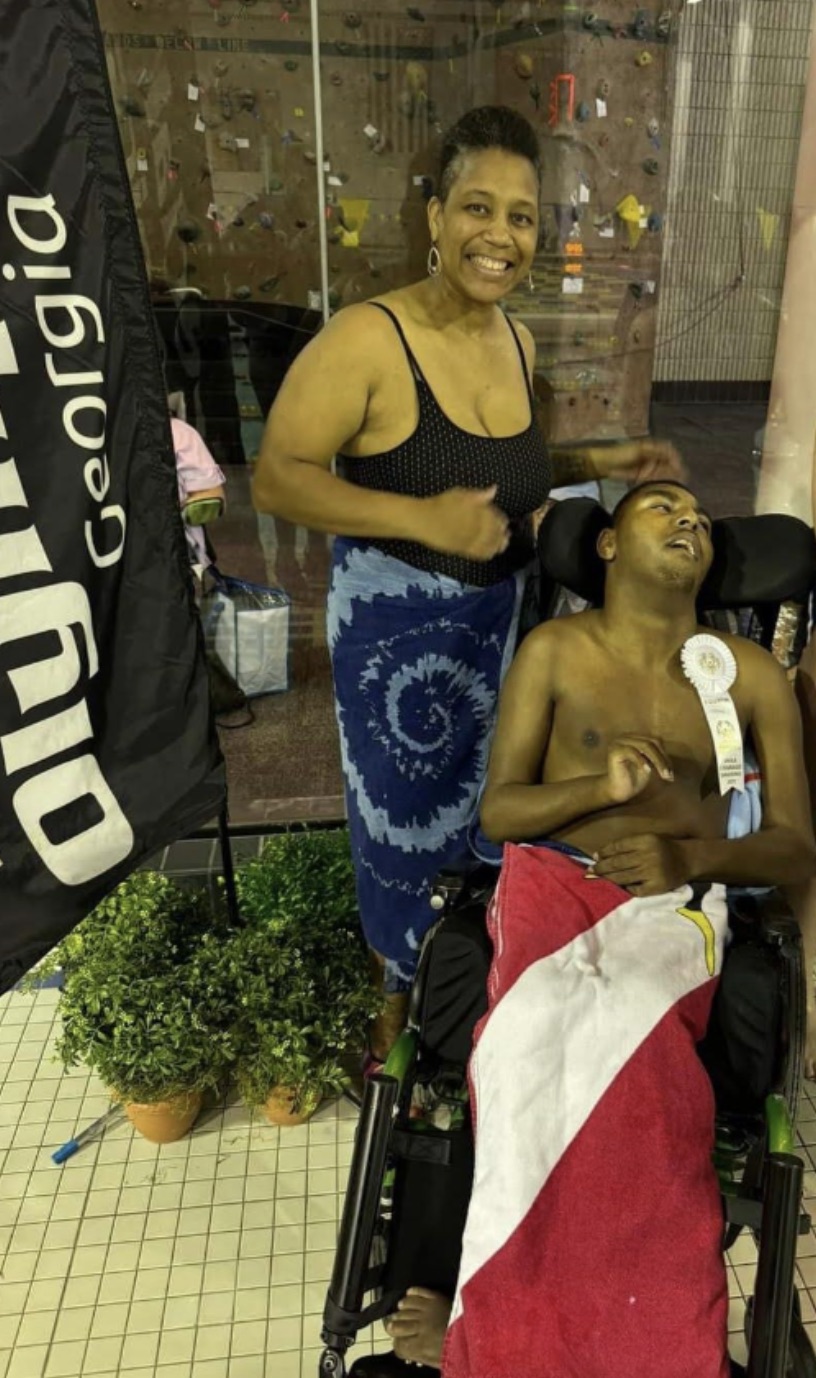 Identifying the things that bring me joy and mixing that with opportunities that I want for Noah is what has helped us go beyond surviving and into the land of thriving. Most recently, we’ve discovered and entered the world of Special Olympics. To me, the Special Olympics has always been a one day, school field day with various athletic stations for the kids in the special education classes.
Identifying the things that bring me joy and mixing that with opportunities that I want for Noah is what has helped us go beyond surviving and into the land of thriving. Most recently, we’ve discovered and entered the world of Special Olympics. To me, the Special Olympics has always been a one day, school field day with various athletic stations for the kids in the special education classes.
What I discovered is that the Special Olympics is filled with meaningful events, and opportunities to meet new people, explore new sports, and have purposeful engagements with self and others – for the most dependent of people. Participating with one of our local Special Olympics chapters, Noah and I both have found a local, in-person community that we both desperately needed. With the support of the community, particularly involvement in our multi-endurance sports group, The Kyle Pease Foundation, we continue to have new experiences and phenomenal places to win emerge.
Alongside the Special Olympics, being active in the National Park Service’s Junior Ranger program has helped me quell any thoughts of resentment. Noah is a multi-endurance athlete completing numerous races including seven Marine Corps Marathons, four triathlons, and countless 5ks, 10ks, and half marathons. Noah has also earned over 45 Junior Ranger badges by visiting and completing activity books specific to national parks, monuments, battlefields, and historical sites..
I’ve learned to cherish the months, weeks, days, minutes, and even seconds. I’ve learned to state and delve into my fears and acknowledge all of my feelings. I’m learning to lean into this awkward place of “in between.” I’m living the life that I wanted (for the most part) it just didn’t develop or look how I expected. We have a life full of love and adventure.
Life is too short to live consumed with contempt, resentment, unforgiveness, fear or hopelessness.
Find or create, if you must, ways to feed your soul and nourish your familial desires.
Naomi D. Williams is a perfectly imperfect person on a mission to empower individuals and families to live their best life, now. As a Life Doula, she helps people navigate and process major life altering events. Naomi believes anyone and everyone can and should lead an exceptional life. She is the proud mother of a former 26-week preemie who lives with a host of diagnoses that fall under the primary umbrella of spastic quadriplegia cerebral palsy. She uses her and her son’s past and present experiences to inform and partner with healthcare systems as they live out the consequences of not being considered a valuable member of their care team. Naomi is the author of And God Remembered Noah: A mother’s heart-opening journey through 22 weeks in the NICU. When not advocating for her family or others, you can find Naomi getting lost exploring nature or taking a deep breath on her yoga mat. Find her at exceptionalliving101.org , Noahland.Art and on LINC-d. com or Linked In
Theme: Making Memories
Our simple home is nestled back in the woods alongside a sparkling creek. Being out in those woods was my daughter’s favorite thing. Izzy had the ability to engage with nature in a sacred way. She held burial services for butterflies and had a ‘thinking tree’ where she would go to talk to God. From picking dandelions and catching lightning bugs, to building forts from fallen limbs, she loved all of it.
Early on in life, cancer taught Izzy the reality of her favorite things. She was deeply aware that they were privileged. They were precious. And they were never promised. There were years when Izzy’s body was strong enough for the great outdoors and years it simply wasn’t. Years the walls of the hospital felt like our saving grace and years they felt like a prison to a sacred spirit like Izzy.
On the corner of our property there lies a Buckeye Tree, whose limbs twist and turn creating the most beautiful canopy. Each Fall her twisting limbs let go of the life she’s spent the whole year growing. Her ‘fruit’ falls to the earth in the spiny, little shells where it has grown. When ready, the shells can easily be peeled away revealing to its finder a smooth, shiny nut called a buckeye.
Collecting buckeyes was a fall tradition that Izzy cherished. She would collect a handful, then take them to the side and peel apart the shell in wonder. Somehow, each one she opened was always more beautiful than the last. Week after week she would collect her treasures in a bucket, waiting for the very last one to fall.
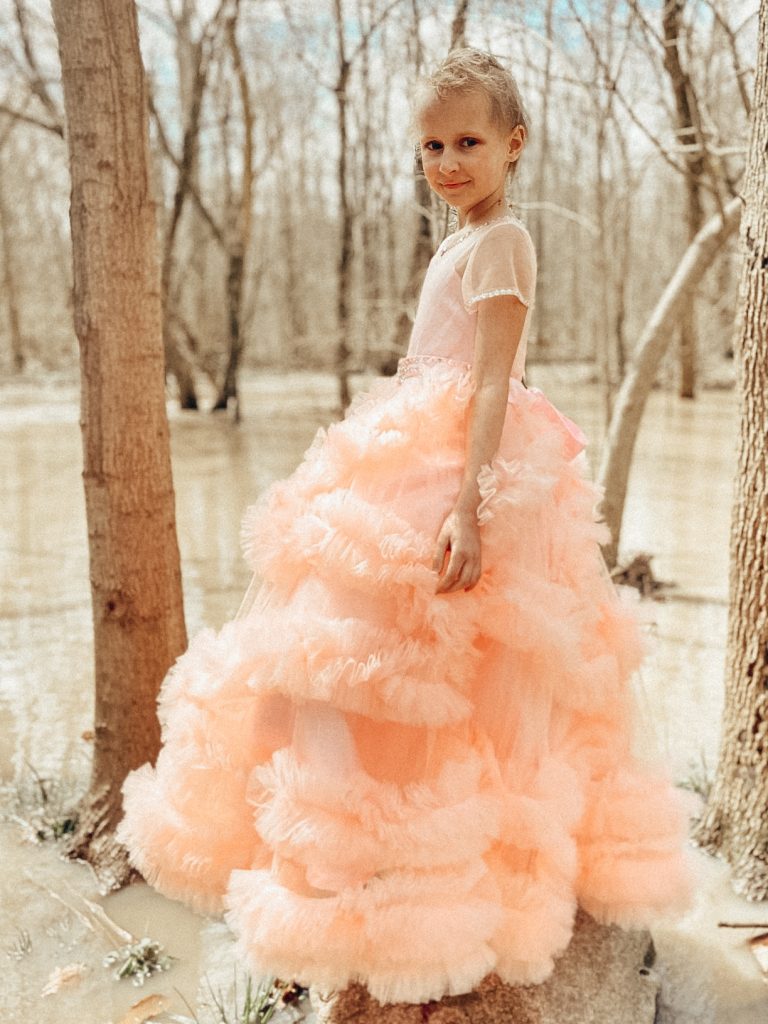 One fall day we came home from the hospital after getting platelets and blood. She felt so good that as soon as I put the car in Park, she swung open the door and raced to Buckeye tree. When I got to her, I found she was throwing rocks into the tree, for the buckeyes weren’t quite ready to fall. I laughed at her and told her to be patient. Told her they would probably be ready the next week.
One fall day we came home from the hospital after getting platelets and blood. She felt so good that as soon as I put the car in Park, she swung open the door and raced to Buckeye tree. When I got to her, I found she was throwing rocks into the tree, for the buckeyes weren’t quite ready to fall. I laughed at her and told her to be patient. Told her they would probably be ready the next week.
For all of my life, I will never forget her response. I will never forget her candor, nor her wisdom as the truth in her eyes met the truth in my own. “But my legs don’t hurt today, and they might hurt next week,” she said. I stood frozen, in awe of her ability to navigate the very unfair cards she was dealt. Then, with silent tears streaming down my face, I approached the Buckeye tree and told her I would help.
Izzy died the following Spring. In our simple home, nestled back in the woods alongside a sparkling creek. I still see her out there. Exploring the woods and collecting treasures like fallen buckeyes. And I hear her wisdom, beckoning me to stay aware. Of what is privileged, what is precious and what can never be promised.
________________________________________________________________________________________________________________
Molly is a Writer, Speaker, and End of Life and Grief Coach in the Indianapolis area. She spent a decade in Pastoral Care before spending the next decade caring for her daughter throughout her cancer journey. She has combined both experiences to help others navigate unimaginable journeys. You can find her writings and teachings on IG at: the.grief.writer, or online at: mollymattockscoaching.com.
Theme: Making Memories
Parenthood is a journey marked by countless milestones, each filled with its own unique challenges and triumphs. As caregivers, we navigate this terrain with a blend of hope, determination, and unwavering love, striving to create an environment where our children can thrive and flourish. Yet, amidst the hustle and bustle of daily life, it is easy to lose sight of the importance of celebrating each child’s journey as an individual, free from the constraints of comparison or competition.
In a world that often places undue emphasis on achievement and conformity, it is essential to cultivate a culture where every child’s progress is valued and cherished on its own merits. This philosophy is one that I hold dear to my heart, shaped by my own experiences as a caregiver and informed by the unique journey of my family.
As a parent to three beautiful kids, two youngest with Koolen-de Vries syndrome, a rare chromosome disorder, inherited from me. I have come to appreciate the beauty and complexity of individuality. Each of my children, with their own set of strengths and challenges, embodies a testament to the resilience that thrives within us all. From the earliest stages of their development, I made a conscious decision to celebrate their progress with equal passion and excitement, regardless of neurodiversity or developmental differences.
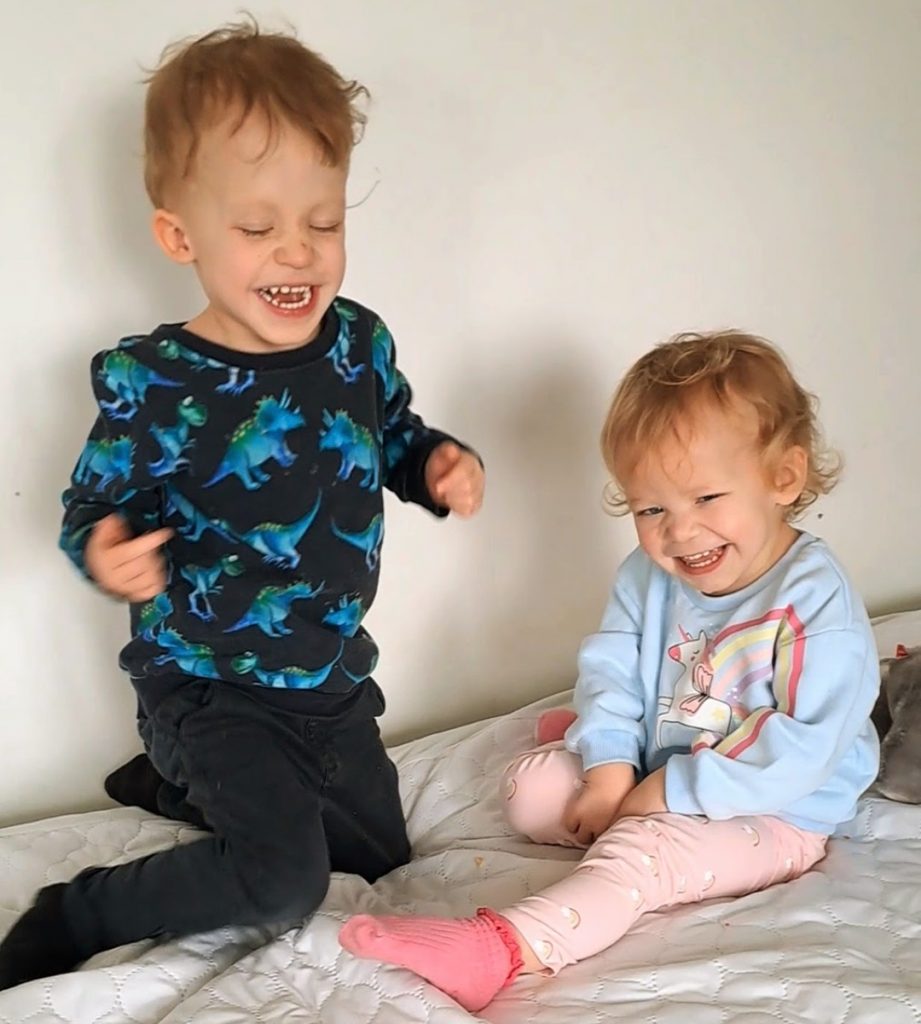 This commitment to celebrating individual journeys was recently reaffirmed during a conversation with my daughter’s teacher. As we sat together in an empty classroom, discussing her progress, I was struck by the importance of conveying my belief in the power of celebrating uniqueness. Despite the teacher’s concerns and the pressures of societal expectations, I made it clear that I harboured no sense of worry or comparison. Instead, I emphasised the importance of nurturing an environment where every child’s journey is honoured and celebrated, free from the constraints of comparison or competition.
This commitment to celebrating individual journeys was recently reaffirmed during a conversation with my daughter’s teacher. As we sat together in an empty classroom, discussing her progress, I was struck by the importance of conveying my belief in the power of celebrating uniqueness. Despite the teacher’s concerns and the pressures of societal expectations, I made it clear that I harboured no sense of worry or comparison. Instead, I emphasised the importance of nurturing an environment where every child’s journey is honoured and celebrated, free from the constraints of comparison or competition.
The response from fellow caregivers has been one of admiration and solidarity. It is clear that this philosophy resonates deeply with parents who, like me, understand the importance of embracing the beautifully diverse tapestry of our children’s lives. Regardless of their neurodiversity or developmental differences, we share a common bond in our commitment to celebrating each child’s journey with unwavering passion and excitement.
In a society that often perpetuates comparison and competition, it is essential for caregivers to stand as beacons of encouragement and support. Let us create a culture where every child’s progress is celebrated, where differences are not merely tolerated but embraced as the true measure of greatness. Together, we can foster an environment where our children feel valued, accepted, and empowered to embrace their true selves.
As I reflect on the profound impact of this philosophy in my own life, I am reminded of the power of storytelling to inspire, uplift, and connect with others on a deeply human level. It is through sharing our experiences and perspectives that we can build a community grounded in empathy, compassion, and understanding.
To all the caregivers out there, I offer these words of encouragement: celebrate your children’s progress with the same excitement and passion, honoring their individual journeys without comparison or competition. For it is through our unwavering support and celebration that our children will flourish, each in their own beautifully unique way. Together, let us champion the cause of individuality and celebrate the diversity that makes each child special.
As we continue on this journey of caregiving, let us do so with hearts full of love, minds open to possibility, and spirits lifted by the knowledge that we are shaping the future one precious soul at a time. Together, we can create a world where every child feels valued, accepted, and celebrated for who they are – a world where uniqueness is not only accepted but embraced as the true measure of greatness.
About Becky
Theme: Making Memories
Parents at the bedside of their 21-year-old medically complex son talk about all of the things their son has been able to experience – including his meeting WWE John Cena — and how they take such comfort in that.
Theme: Making Memories
The mom of a boy who died of Krabbe Disease describes the small team of people she invited to his service: his pharmacist, his PT/OT people. “The people who saw us in our home setting.” She grieves the broader community of people he never got to meet but fights the regret and gives herself grace for keeping his world small.
Theme: Making Memories
The day started with a brunch full of bagels, talk of our Camden and their Myles, and deep, authentic, soul-filling empathy. It was one of those mornings where I dared to linger in the home of new friends, and then linger longer, and only thought to question it after the fact.
How could I step away from the photographic archive of their darling boy? How would I be more understood than in that light-filled living room? How do you fill the space that remains when a life ends far too soon? A morning spent with my new friends, Julie & Matt, now bereaved parents, was a balm on my anxious soul.
Kyle, Camden and I eventually left, the routine of medications pulling us back home. This, too, was understood by parents who longed for their boy who needed them for care and medications, for a boy who was still here.
I slipped my Birkenstocks back into place and, as I glanced toward the floor, saw two shoes with velcro closures. Shoes, orange and blue, and a third of the size of mine. These shoes looked too new. They were; they were waiting for the return of a foot that left too soon. They no longer had a utility but that was not the point – they were purchased for, worn by, and reminded us all of Julie and Matt’s darling boy so by the front door they remained.
The two pairs of shoes Camden owned were never intended for walking; indeed we gravitated toward the moccasins that never stayed on his foot for long in the first place. In the shuffle of settling Camden and his oxygen tank and feeding pump backpack into the car, one moccasin that had wiggled free was picked up and placed on the roof of the car. I reminded Kyle of the location of the shoe, Camden was buckled, and then we were on our way back to our quiet home.
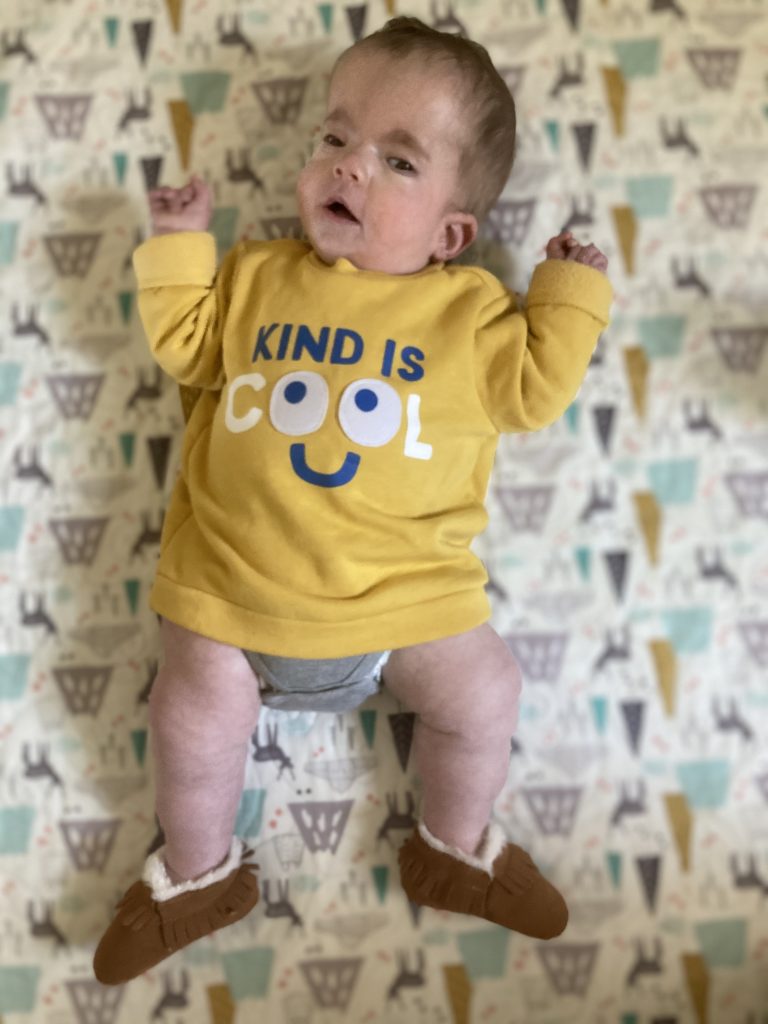 It was at home that the realization struck: “I didn’t take his shoe off of the car.” I offered forgiveness, asked our friends to be on the lookout, and moved onto medication and our care routines. But I was the only one; my husband, Kyle, met my gaze with red, tearful eyes. The shoe was gone. The shoe that Camden most often wore. The shoe that garnered compliments from every mama-friend, the shoe that was his.
It was at home that the realization struck: “I didn’t take his shoe off of the car.” I offered forgiveness, asked our friends to be on the lookout, and moved onto medication and our care routines. But I was the only one; my husband, Kyle, met my gaze with red, tearful eyes. The shoe was gone. The shoe that Camden most often wore. The shoe that garnered compliments from every mama-friend, the shoe that was his.
Kyle initially wanted to retrace our route home, to find the moccasin that surely would have blended in with the collections of brown, fallen leaves. I offered him the time and my support to do so. Perhaps that was enough for him to pause, breathe, and collect himself – he would stay, to be with me and Camden.
One day, a day that will arrive far too soon, all we will have are the things. But for now, this precious now, we have Camden with us. And all sweet Camden wants is for us to be with him. “Everyone is here,” we announce and affirm to him at least 20 times a day. Everyone is here, and though he cannot comprehend it, here and now with him is everything to us.
Those who have walked the road of parenting know that becoming a parent will change your life. What we never could have foreseen is how becoming parents, in the midst of a global pandemic, to a medically complex surprise of a child would change everything. For me, the changes, though far less drastic, began soon after becoming pregnant – changes to the activities I could participate in, the foods & drinks that I could consume, the way my entire being felt and moved through the world. I, some days more gracefully than others, adapted and redefined what added quality to my life.
The start of the pandemic led to another iteration of what I could see, do, or pursue to fill my cup. And then a new definition was born as I met and learned to parent Camden. And even today, one and half years into this journey with our son, it seems that each week, day, hour demands that I redefine what a high quality of life looks like for myself, my son, my marriage.
In the early weeks of Camden’s life, I realized that there would be no baby book of memories and milestones, only records kept by doctors, nurses, therapists. I recognized and resented that our family sleepovers would not occur in a tent among the trees in the mountains of Colorado, but in various rooms of the Children’s Hospital of Colorado. I realized that every expectation that I had for parenting and our life as a family of three would have to be put aside, to either be readjusted or discarded in the future.
Whenever our family has the opportunity to do something or go somewhere together, it is a pure, albeit carefully timed and calculated joy. But the simple act of being with each other is the blessing. Even on the days when I want more, different, greater, the being has to be the blessing. When all of the going and doing and experiencing ceases, being is all that remains.
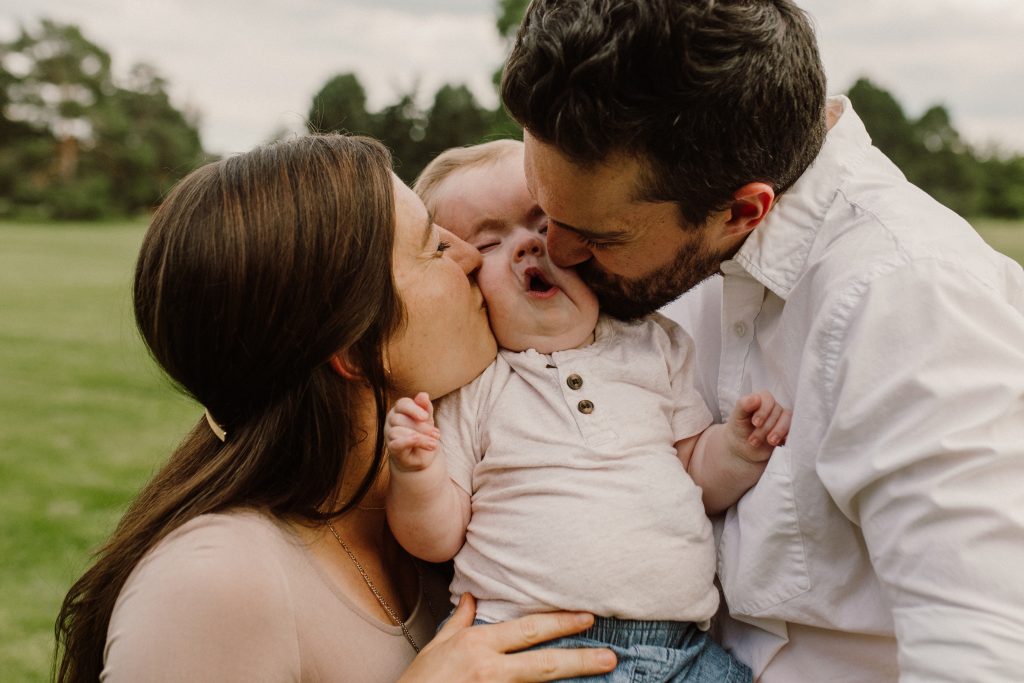 This has been the aftermath of the combined forces of a global pandemic and a medically complex, fragile boy. The reality is that remaining in the present moment and living as if everyday could be his last is exhausting. I cannot do anything, much less constantly looking for the end, for long before the exhaustion sets in.
This has been the aftermath of the combined forces of a global pandemic and a medically complex, fragile boy. The reality is that remaining in the present moment and living as if everyday could be his last is exhausting. I cannot do anything, much less constantly looking for the end, for long before the exhaustion sets in.
But when I focus on being, there is a bit more ease in the air of our home, in between the words we speak to and the hugs we offer one another. There is more room for self-forgiveness, for the times when I am not vigilantly present. There is room for mourning: the unfairness of this situation, the shoes that are missing little feet, and all of the what-ifs that will never be realized.
There is space to collect, hold and keep the things that define Camden’s life here. Space to take too many pictures that, admittedly, all look the same to you at the end of the day. And space to sit and linger in the light or anger or sadness of the moment I am in. Better yet if the lingering occurs around a table with dear friends, sharing a batch of homemade bagels.
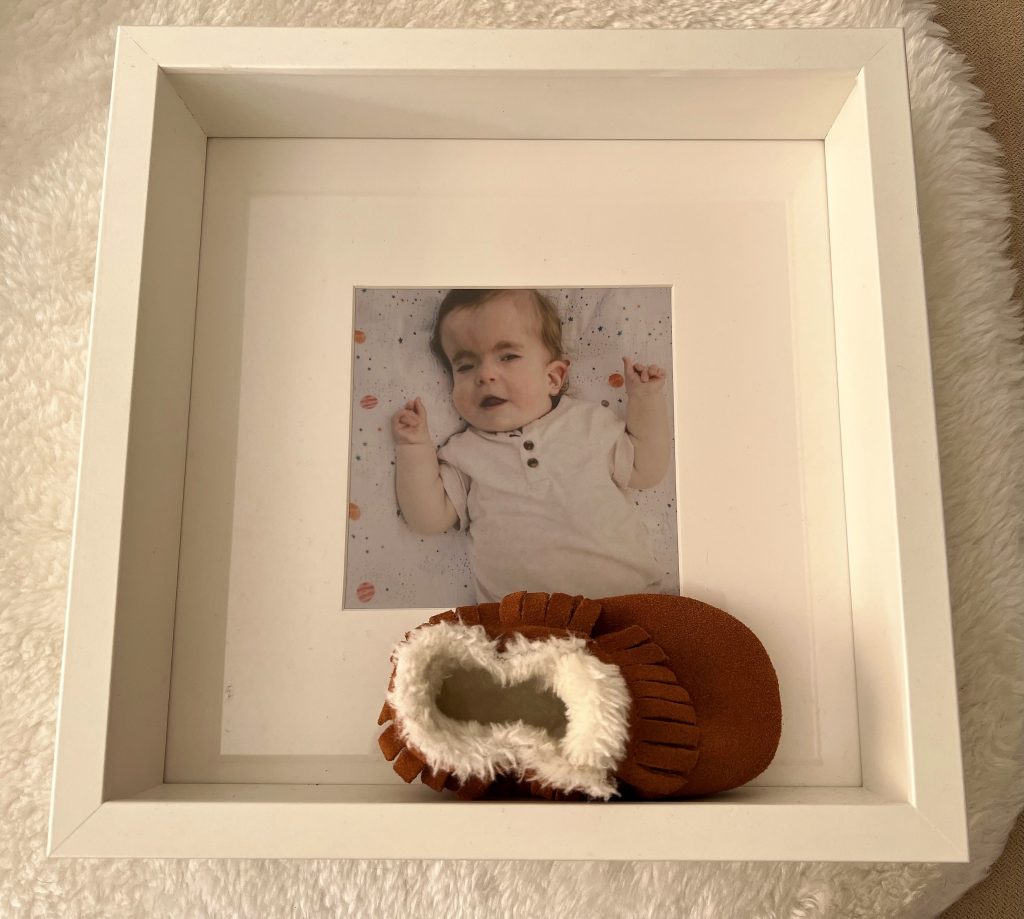 The replacement moccasins that I purchased after this brunch, at the end of November, arrived a few days later. I have detailed the trials of December 2021 in a previous post but, for the purposes of honestly ending this story, the most pertinent and heartbreaking fact is this: Camden never got to wear his new moccasins. The shoes remain in the plastic in which they arrived and will, perhaps, one day be reverently passed on to a little sibling. Camden’s single, worn tan and shearling shoe now resides in a ‘memory box’ frame, next to a picture of his beautiful face; now, all we have is his shoe and we miss the boy whose feet filled it every hour of the day.
The replacement moccasins that I purchased after this brunch, at the end of November, arrived a few days later. I have detailed the trials of December 2021 in a previous post but, for the purposes of honestly ending this story, the most pertinent and heartbreaking fact is this: Camden never got to wear his new moccasins. The shoes remain in the plastic in which they arrived and will, perhaps, one day be reverently passed on to a little sibling. Camden’s single, worn tan and shearling shoe now resides in a ‘memory box’ frame, next to a picture of his beautiful face; now, all we have is his shoe and we miss the boy whose feet filled it every hour of the day.
________________________________________________________________________________________________________________
Nicole Miner has a background in nursing and public health, and became a mama and full-time caregiver for her first child, Camden, in July 2020. Camden was born with a rare, neurodegenerative condition, Schinzel-Giedion Syndrome (SGS), and spent eighteen beautiful and challenging months earthside before the disease progression took him to his heavenly home. Nicole is spending her days in Denver, Colorado soaking up as much sunshine as possible, reading and writing, and preparing home & heart for Camden’s little sister who will arrive later this year.
Theme: Making Memories
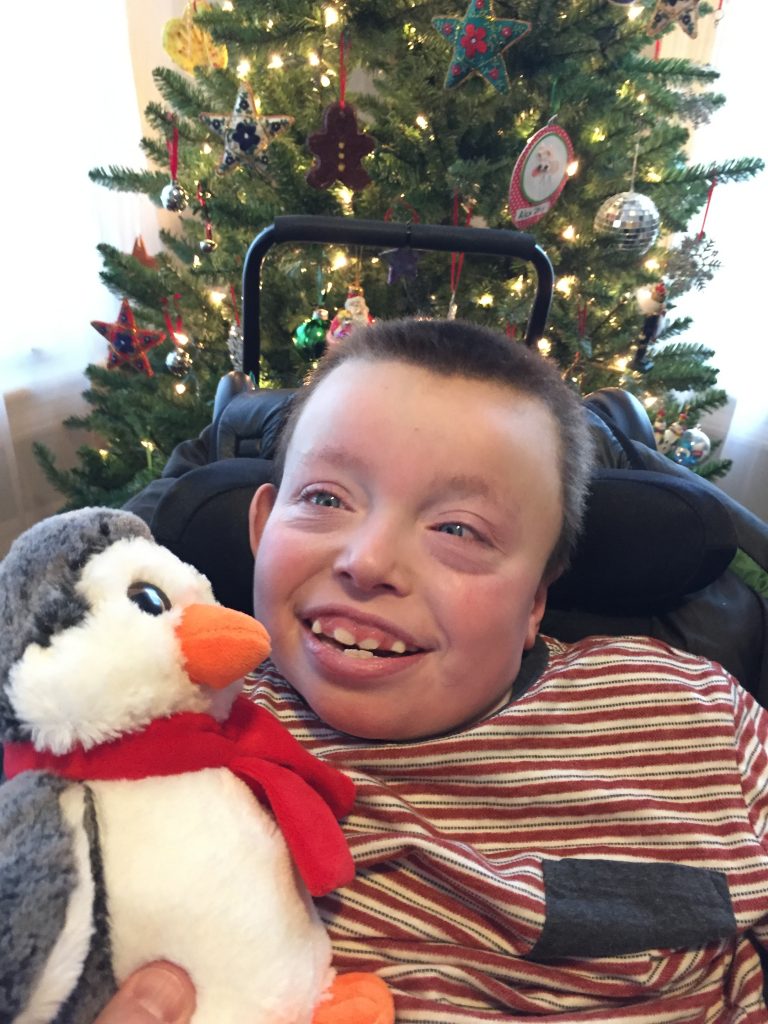 Our son Lucas was born on the Winter Solstice, the longest night of the year. Right away we knew there were unusual medical concerns, but it would take another year before Lucas was diagnosed with Menkes Syndrome. At one day old, we only knew he needed to be in the NICU for the next several days. We and his doctors had to work through the darkness of that long night searching for some clue that would shed light on his condition. My wife and I were still optimistic enough to think this was some short-term medical need that could be fixed in the days ahead. But until then, we needed to be in the hospital. We would not be home for Christmas.
Our son Lucas was born on the Winter Solstice, the longest night of the year. Right away we knew there were unusual medical concerns, but it would take another year before Lucas was diagnosed with Menkes Syndrome. At one day old, we only knew he needed to be in the NICU for the next several days. We and his doctors had to work through the darkness of that long night searching for some clue that would shed light on his condition. My wife and I were still optimistic enough to think this was some short-term medical need that could be fixed in the days ahead. But until then, we needed to be in the hospital. We would not be home for Christmas.
Christmas in the hospital seemed like a bleak prospect. When the offer came to stay at a nearby Ronald McDonald House to be more comfortable, we jumped at it. But I’ll be honest, I expected it to be the most depressing Christmas of my life. I could not have been more wrong. This home was warm, welcoming and calming. Several common rooms were packed with decorations and Christmas trees with presents around them – presents for us! Meals were provided too. I was amazed at how comforting it was. The main living room was aglow. I know it was from the Christmas lights but it felt like the walls themselves were made of gingerbread and radiating warmth. It was still the worst Christmas of my life – the most stressful and fear filled –but it was also beautiful, inspiring and affirmed the true meaning of the season of giving.
From day one of Lucas’ life, I was acutely aware of how different our lives had become. My wife and I had been fortunate enough to never have experienced a struggle we could not manage on our own. We were the people who could help those less fortunate. Suddenly, we were the ones who were less fortunate. Neither of us had ever needed or accepted charity. Now we had to. We needed the help of a place to stay and meals that we neither cooked nor paid for. It was hard to adjust our minds to this new state. It was so foreign to us and tough on our pride. No one wants to be dependent on the kindness of strangers, but it did open my eyes to the beauty in their generosity.
The dull ache of knowing we were the ones in need of someone’s goodwill that Christmas, marked the beginning of our new understanding of giving. We moved our minds past notions of exchanging gifts, or even sharing of our gifts. We’re all told it is better to give than receive, but I think there’s a bit of an art to being an open recipient. With Lucas’ birth we were getting a crash course in that. I hope we managed it with some grace.
At the time, we didn’t know those ten days around Christmas would not be an isolated example of needing and accepting help. In the months and years ahead, we had to get used to asking for help for our son. Sometimes it was just asking for extra consideration or kindness; sometimes it was leaning on government programs; and sometimes it was turning to a charity because we were in need. We wanted to be self-reliant and proud but Lucas’ needs sometimes grew beyond what we could handle without help.
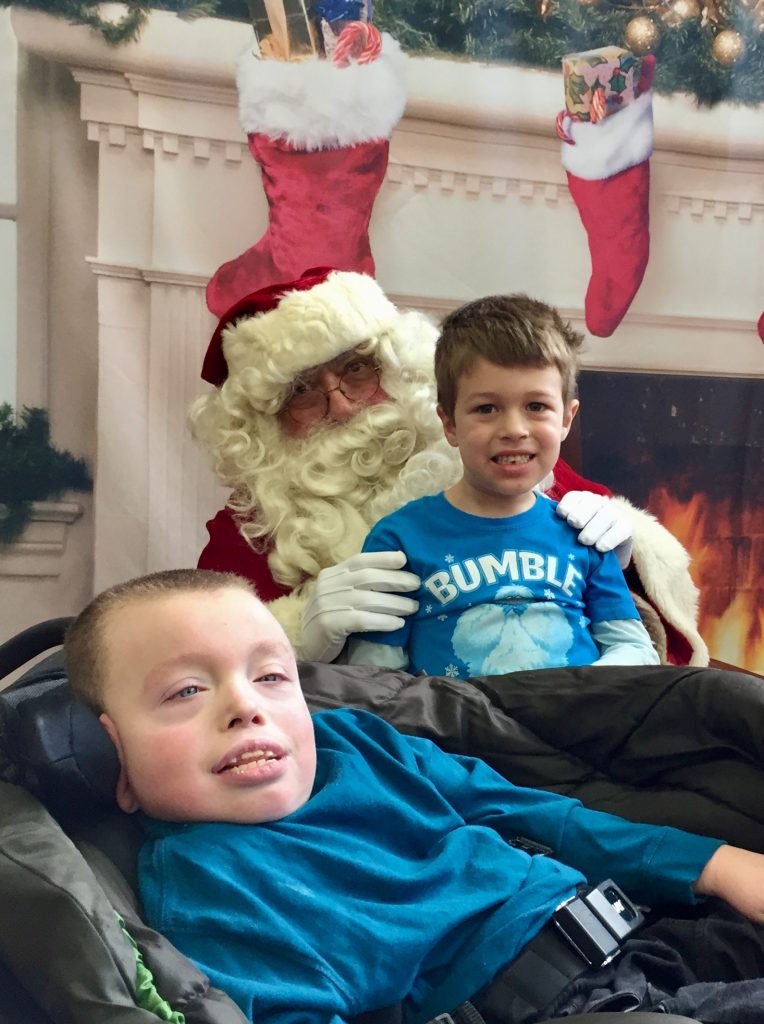 Even after we learned that Lucas’s prognosis included severe degenerative symptoms and a shortened life, my wife maintained the point of view that many people were in a worse situation than we. And this is completely true, some people were. I was always impressed by her generosity and compassion in this attitude. It was too easy for me in those early days to see our situation as close to one of the worst things that could happen to anyone. I envied her ability to hold space in her mind and heart for those who had things even worse than us. But I wonder if another appeal of this otherwise healthy attitude of gratitude might also have been a way to hold on to an idea of ourselves as still apart from those truly in need – we might now be the needy, but we were not the neediest.
Even after we learned that Lucas’s prognosis included severe degenerative symptoms and a shortened life, my wife maintained the point of view that many people were in a worse situation than we. And this is completely true, some people were. I was always impressed by her generosity and compassion in this attitude. It was too easy for me in those early days to see our situation as close to one of the worst things that could happen to anyone. I envied her ability to hold space in her mind and heart for those who had things even worse than us. But I wonder if another appeal of this otherwise healthy attitude of gratitude might also have been a way to hold on to an idea of ourselves as still apart from those truly in need – we might now be the needy, but we were not the neediest.
I couldn’t help feeling that in my son Lucas, we had our own version of Tiny Tim from Charles Dickens “A Christmas Carol.” Lucas was every bit the heart-melting inspiration we needed to be our best selves. He also filled Tim’s role of reminding us that some misfortunes are more serious than others. In film adaptations of Dickens’ story, Tim gets a prominent seat at the head of the table. In our reality, it was hard to get Lucas’ wheelchair quite close enough to the table. Most large family meals would find Lucas oddly angled in a corner, between two chairs – the bulk of his wheelchair mocking our efforts at equal inclusion.
But Tim wasn’t the only example Dickens would lend to our new life. I became haunted by a version of the Ghost of Christmases Yet to Come. My mind would turn from the joy of our Christmas Present to the sadness for what was likely to come in some not too distant Christmas Future. The image of Lucas’ place at the table, now empty, was not just a possible future to be decided against, like in A Christmas Carol. From the day we learned his diagnosis, we knew it would someday come.
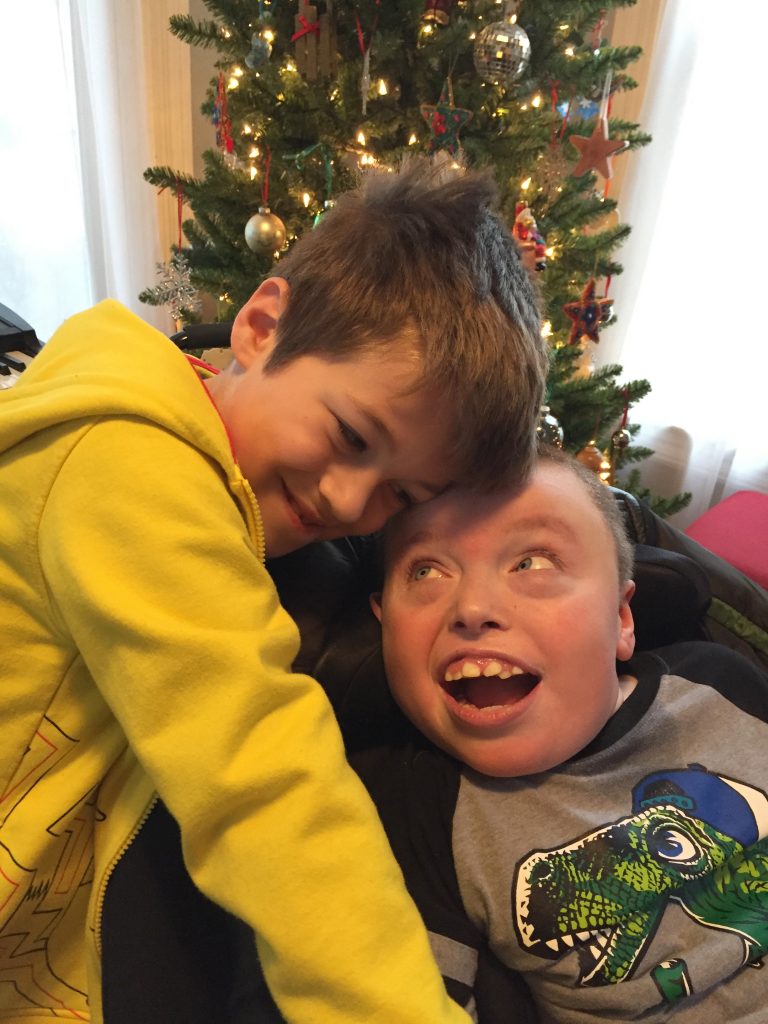 Last week Lucas’ younger brother, age 10, said to me: “I was thinking the winter solstice is about bringing change. Lukey was born on the solstice and he brought change because when you have a rare disease, it changes everything.”
Last week Lucas’ younger brother, age 10, said to me: “I was thinking the winter solstice is about bringing change. Lukey was born on the solstice and he brought change because when you have a rare disease, it changes everything.”
His words highlighted the attitude we needed to embrace. Unlike Ebeneezer Scrooge who learned from the Ghost’s visit that he must change his behavior to avert tragedy, we knew we could avert none of it. None of it – except our approach to it. So the dark visions of our Christmases-yet-to-come would instead inspire us to embrace change and make the most of the life ahead. We’d draw from the darkest night the lesson that the light does return and our time in it is precious. We will be open to the unexpected, to the uncomfortable and especially to unexpected gifts.
________________________________________________________________________________________________________________
At the age of 12 months Daniel’s first child Lucas was diagnosed with the rare disease Menkes Syndrome. After adjusting his expectations of what raising a child might look like, Daniel began to tell Lucas’ story with a short documentary: “Menkes Disease: Finding Help & Hope” narrated by Oscar nominee Mary McDonnell. That film led to Daniel co-founding with Bo Bigelow DISORDER: The Rare Disease Film Festival and later The Disorder Channel, both dedicated to spreading awareness for patient families facing any of the more than 7,000 rare diseases.
